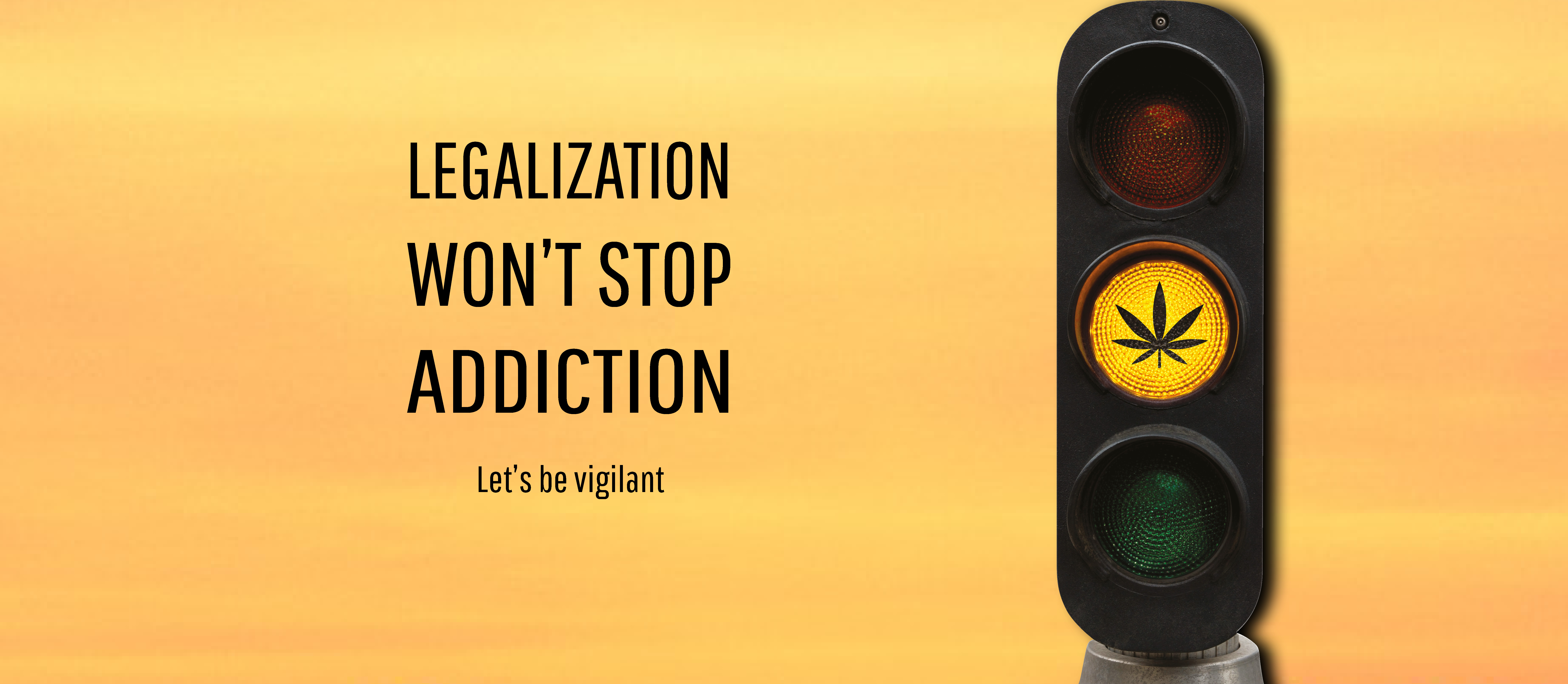Cannabis is the most commonly used illicit drug among Canadians aged 15 to 24, and is more commonly used by youth in Canada than in any other country, according to a study done by UNICEF (2013)[1]. Even more alarming is the fact that many Canadian youth are not properly educated about the effects and harms of the drug (CCSA)[2].
Portage is calling for vigilance in the face of the upcoming legalization of cannabis in Canada. Legalization won’t stop addiction. Instead it trivializes its consumption. A consumption that is continually increasing among the young people who are coming to us for treatment at one of the five Portage drug addiction rehabilitation centres for youth in Québec, Ontario, and New Brunswick. Over the past ten years, the number of adolescent clients who stated upon admission that their most significant drug problem was cannabis has increased steadily (for our adult programs on the other hand, the numbers have remained stable).
This increase could be due in part to the fact that, according to recent study done by CCSA[3], the majority of young people believe that cannabis is less harmful than alcohol and other drugs. This perception, caused by a lack of knowledge about the effects and harms of cannabis, makes it more likely that a youth will begin using the drug.
Perception that Cannabis is not as Bad as Alcohol
The adolescents who participated in the above-mentioned study believe that alcohol, with its associated consequences and problems, is more harmful than cannabis. The perception of someone who is “drunk” – stumbling, yelling, and potentially being violent – is more of a concern than someone who is “high” – relaxed, happy, and snacking on the couch. Furthermore, the negative physical effects of drinking alcohol, such as vomiting, memory loss, and hangovers, don’t happen when using cannabis, as far as they’re concerned.
The perception was that the effects of cannabis use are mainly positive. They made no mention of its negative short term effects, including intense anxiety, panic, and psychotic symptoms, which can be felt even by inexperienced users. Long term effects were not mentioned either. Yet many scientific findings show a link between “regular” or “heavy” cannabis use (daily or nearly daily use) and physical, mental, and psychosocial health consequences (CCSA)[4]:
- The risk that cannabis use could be a gateway to the use of other illicit substances;
- The risk of addiction and of developing a tolerance and withdrawal symptoms such as depression, insomnia, anxiety, and appetite disorders;
- The risk of developing psychotic disorders, such as schizophrenia;
- The risk of intoxication (there were 1,600 reported hospitalizations linked to cannabinoids in Canada in 2011);
- The risk of developing a learning disability and of having trouble doing school work.
According to most experts, these negative effects arise because of how cannabis causes significant structural and neurochemical changes in the adolescent brain, which is continuing to develop until the age of twenty-five.
Perception that Cannabis has Little or no Impact on Brain Development
When asked about how cannabis affects brain development, the majority of youth understood that cannabis is potentially harmful, but didn’t really know how or why. The concern that it could be harmful was not strong enough to stop them from using the drug, however. Many believed that the negative long term effects caused by using large quantities of cannabis over a long period of time would not be evident in the short term. Recreational or moderate use would have no impact on the brain.
Experts are unanimous about the effect of cannabis on the developing brain. “A number of key neurodevelopment phases must occur during adolescence before the brain is fully ready for adulthood. […]The regions of the brain that undergo the most fine-tuning during the teenage years are those responsible for decision making, judgment, planning and problem solving, and these regions are potentially most susceptible to cannabis when they are not yet fully developed”[5].
That’s why Portage has recommended to the federal and Québec provincial governments not to legalize cannabis for people who are less than 21 years of age. Failing to consider this proposal, we’ve recommended that the 18 to 24 year old age group be prioritized by the vigilance committee and for research activities during the cannabis legalization bill’s transition period.
Cannabis Addiction Misunderstood
The risk of addiction has been mentioned above as one of the effects of cannabis use. When youth research participants were asked about the addictive nature of cannabis, in other words, the potential of becoming addicted to it, many believed that there is none at all.
Some perceived cannabis addiction as a very different type of addiction as compared to other drugs. “For instance, it was suggested by some participants that addiction to cannabis would occur gradually over time, as a habitual thing compared to the immediate physical reactions of other drugs (e.g., cocaine) or only in cases where someone is using copious amounts of the drug. Cannabis addiction was said to be ‘mental’ as opposed to physical, where the person is addicted to the feeling of being high on cannabis as opposed to the body craving the substance”[6]. In essence, the participants seemed to feel that their cannabis use was under control and that they would be able to stop whenever they wanted. (Read The Treacherous Pitfalls of Drugs and Alcohol).
Conclusion: Concerning Misconceptions as Canada Prepares for Legalization
Believing that cannabis use can’t cause addiction, or that if it did it would only be a “mental” addiction, young people are all the more exposed to the risk.
Perceiving that cannabis is less harmful than alcohol, they are more likely to start using it.
Thinking that cannabis use doesn’t affect the brain very much or at all, they are vulnerable to its physical and mental effects and potential serious consequences.
Every year, about 500 youth between the ages of fourteen and eighteen come to Portage – 88% of which declare that they are addicted to cannabis. Every day, we’re helping people work through the devastating impacts of cannabis abuse, which in every case, began by the inoffensive and recreational use of the drug.
Read the stories of our residents:
From Pot Smoker to Lamplighter
Seven Ways to Start Talking About Drugs With a Teenager
10 Warning Signs That Your Adolescent May Be Doing Drugs
To view our campaign:
LEGALIZATION WON'T STOP ADDICTION. Let's be vigilant.
[1] https://www.unicef-irc.org/publications/pdf/rc11_fre.pdf
[2] CCSA, Canadian Youth Perceptions on Cannabis, 2017. http://www.ccdus.ca/Resource%20Library/CCSA-Canadian-Youth-Perceptions-on-Cannabis-Report-2017-fr.pdf
[3] CCSA, 2017. The survey was conducted using a quantitative approach.
[4] CCSA, Effects of Cannabis Use during Adolescence, 2015, p. 17. http://www.ccdus.ca/Resource%20Library/CCSA-Effects-of-Cannabis-Use-during-Adolescence-Report-2015-fr.pdf
[5] CCSA, 2015, p. 10.
[6] CCSA, 2017, p. 26.






Leave a Reply